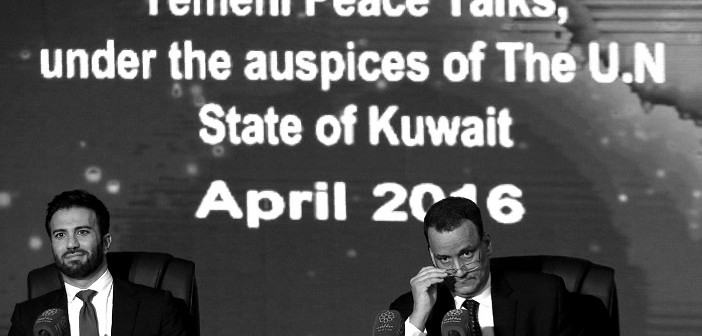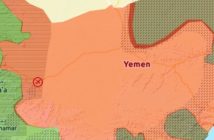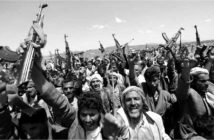Some days after the cease-fire commenced on April 10, and despite violations in different places of the frontlines, we can say that all parties are unwilling to announce the collapse of the truce. The Kuwait negotiations, which were scheduled to start on April 18, but delayed for two days have already been held between the two parties: the legitimate government and its allies and the Houthi camp and their partners, mainly Ali Saleh.
The first observation we can cite about this truce and the negotiations is the significant and effective decision by President Hadi in the run-up to these talks. I mean his decision to dismiss Khalid Bahah from his two posts as Vice President and Prime Minister. What is most important, is that these decisions bring the General Ali Mohssen Al-Ahmer with his significant influence into the position of second man in the state leadership hierarchy, the post of Vice President. This has come shortly after he had been appointed as the deputy commander in chief. This decision has demonstrated a political determination to raise the level of practical escalation.
In addition, he appointed Abdullah Saleh, the deputy president of the General People Congress (GPC) and one of the most prominent dissidents,as Prime Minister. Meanwhile, the cabinet line-up has not been changed. The statement of Hadi’s decision put blame on the former Prime Minister Bahah for the failure of the government in different fields and on various levels. The decision also reflected the relation between the two men, which was mired in tensions, besides Hadi’s anxiety about the effort aimed to depict Bahah as the man of the compromise in the country at the expense of Hadi’s discharge.
The fact is that Bahah was lacking any significant political record. He does not have any kind of political or social support or partisan influence. However, he did not conceal his political ambitions in his statements and behaviour. He might expect a compromise at the end of the day, in which the Houthis and the Saleh camp can retain the largest portion of their influence, so he was keen to demonstrate more flexibility than Hadi. He also wanted to keep delicate relations with the Saleh-Houthi alliance.
Given that the Hadi-Bahah disputes were in existence for a long time, these differences did not only reflect the different ambitions of the two men, but also illustrated different attitudes of regional and international powers about the Yemeni issue. It is not right to make Hadi powerless, lacking any determination, decision and personal and public ambition. Likewise it is impossible that the decision of replacing Bahah and appointing General Ali Mohssein Al-Ahmer as Vice President was made without the consent of Saudi Arabia; such a decisionmay indeed be in response to the Saudi’s instructions.
Perhaps, Bahah’s reaction to his dismissal, which ranged from compliance with feeling of bitterness few hours later up to criticism after three days, is evidence of receiving support or gesture from regional and international powers. These powers are probably the United Arab Emirates and the USA. Obviously, the American and Saudi policies do not seem to be identical about Yemen.
While the US promotes a settlement that maintains a considerable portion of their influence and participation in power, Saudi Arabia appears to be more determined to gain greater victory and reduce the Houthis influence and force it into the lowest level. Though the recent weeks have seen significant developments in the Houthis’ relation with Saudi Arabia there is no real indication that Saudi Arabia’s policy has already changed. Saudi Arabia received a Houthi delegation several weeks ago. Besides the stated truce there is also talk of demining the landmines along all borders and of prisoner swaps between the two sides.
Though these significant developments can’t be underestimated, they do not indicate that Saudi Arabia has abandoned its main strategy, which is intended to weaken the Houthis and cut down their influence, even to break their bones, as the Saudis basically describe the Houthis as a tool in the hands of Iran; and it doesnot seem that Saudi Arabia may accept a permanent menace in its soft flank.
Hence, even though Saudi Arabia seems to succumb to the American pressures and move toward truce and political solution, the Saudi leadership preserves its own other options, particularity the military one. In this context the appointment of General Ali Mohssen Al-Ahmer in the position of the second man in the state can be understood. The General with his wide relations among the military institution, besides his great influence within the tribal milieu, particularly in the northern region, appears to be assigned to dismantle the Houthi-Saleh allies in the tribal areas around Sana’a. By doing so, he will help preparing Sana’a for a political settlement in favour of the Saudis’ allies or for the military option which is still the most expected of all, regardless of the talks and negotiations.
Recently, the security situation and living conditions have seen relatively improved in the areas under the control of Hadi’s troops. The war on the terrorist groups has also been intensified in the southern governorates. This has positive impact in favour of Hadi’s team in the negotiations.
Meanwhile, the popular resistance forces have not yet been capable of forming a structure and political leadership -for this reason they are absent in the negotiations and appearas fully associated to Hadi’s government and its options, although most of the popular resistance factions have their own different choices; they even have certain concerns about the agreements being at their expense.
In spite of all what has been said about the truce and settlement, the conditions for a genuine and sustainable settlement are still missing, particularly regarding the exclusion of Ali Saleh and his group, which is the stronger party in the Houthi-Saleh alliance.




